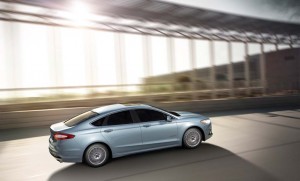
The Hybrid version of the 2013 Ford Fusion is facing an EPA review because of concerns about its 47/47/47 mpg claims.
The Environmental Protection Agency is stepping in to review mileage claims for two of Ford Motor Co.’s two newest hybrid models.
The move was triggered by a report from Consumer Reports magazine that the Ford Fusion Hybrid and Ford C-Max Hybrid delivered substantially lower fuel economy than the maker has widely promoted in its advertising. The federal agency has become particularly sensitive to the issue following the discovery that South Korean carmakers Kia and Hyundai fudged the fuel economy figures for 13 of their own products.
According to Consumer Reports, after 2,000 miles of driving the two Ford hybrids got as little as 35 miles per gallon in city driving, 12 mpg lower than Ford claims, while the two models fell short on the highway and combined driving cycle tests, as well. The C-Max and Fusion gas-electric models are rated at 47/47/47 mpg.
Ford responded to the influential non –profit magazine by insisting that mileage can vary and insisting that owners have often reported mileage higher than the EPA-approved figures. For his part, Linc Wehrly, director of the EPA compliance division’s test center in Ann Arbor, Michigan, cautiously echoed that position, telling the Detroit News, “”a hybrid vehicle is going to be far more variable than a conventional vehicle” when it comes to observed fuel mileage.”
Nonetheless, the EPA is apparently going into crackdown mode after discovering during an audit of Hyundai and Kia mileage claims that the two Korean firms overstated their fuel economy by up to 6 mpg on 13 separate models. They have been forced to roll back the numbers – an embarrassment for the firms which had previously advertised a number of products getting more than 40 mpg – and issue credit to owners.
The agency had indicated it would be looking at other manufacturers to see if they were also properly complying with the fuel economy regulations and that review now will put Ford under the microscope.
The EPA has been mandated by Congress with overseeing both the Corporate Average Fuel Economy, or CAFE, standards, and with ensuring the accuracy of industry mileage claims. But the agency relies on the makers to handle the actual testing and analysis and, some fear, with fuel economy now considered the top priority of most American motorists, there is growing pressure to bend the data.
Ford global marketing chief Jim Farley has said the maker will not be caught abusing the regulations, and the company issued a statement asserting, “Early C-MAX Hybrid and Fusion Hybrid customers praise the vehicles and report a range of fuel economy figures, including some reports above 47 mpg. This reinforces the fact that driving styles, driving conditions, and other factors can cause mileage to vary.”
The C-Max and Fusion Hybrids can be operated at up to 62 mph in electric mode, a clear advantage in the EPA testing process which tests vehicles only up to 60 mph. Even at lower speeds, the two Ford vehicles will fire up their gas engines if the battery is low or if a motorist drives aggressively, and that can significantly reduce fuel efficiency, the maker acknowledges.
Like Hyundai, there have been a number of reports and reviews that found the C-Max and Fusion Hybrids delivering less than the mileage claimed. But critics note that this is far from unique. Variations of as much as 20% are common, especially on battery-based products. The EPA revised its testing and analysis process in 2008 largely to help make hybrid vehicle results more in sync with real-world driving.
It’s unclear how long the EPA review of the Ford hybrids will take.
The agency could adjust the numbers but find Ford in compliance with current testing rules. Were the maker to have clearly violated the procedures, however, it would be subject to significant fines and might have to take steps similar to Hyundai and Kia to satisfy owners.
Those two makers still face the threat of legal action. Several owners have already filed claims against the Korean brands.
